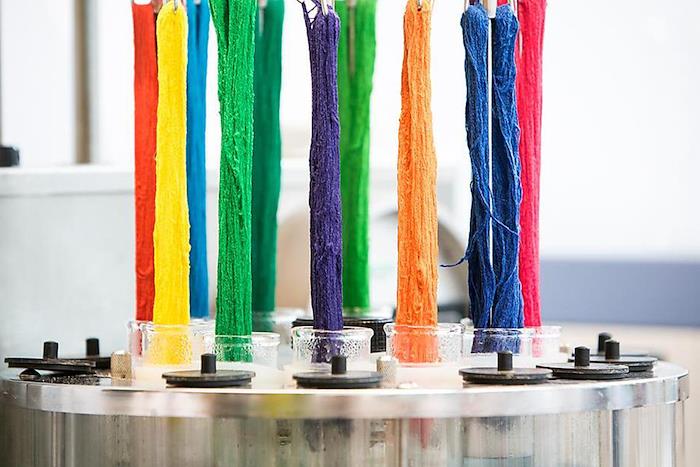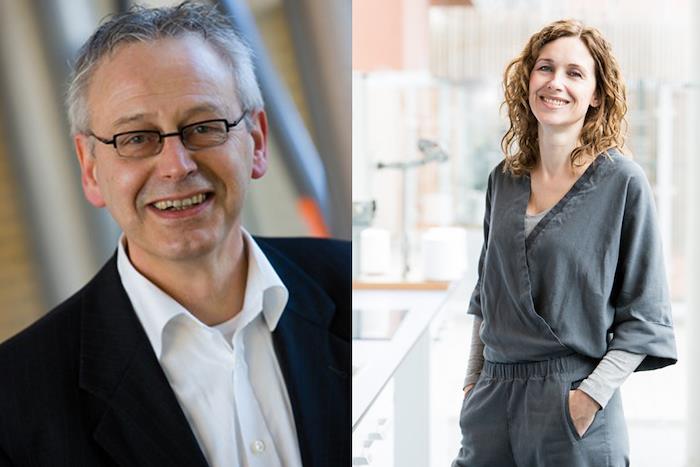In short
- Saxion contributes to a circular economy through its many studies
- Their ‘Smart Functional Materials’ lectorate continuously innovates
Global Goal

- Sustainable textile: development of new materials such as the SaXcell recycled cellulosic fibre. Research is done into biomaterials and locally produced fibres. Design for recycling and the circular economy of the textile chain are essential themes. Check out actual projects regarding sustainable textiles at Saxion right here.
- Responsive smart textiles: textiles that respond to changes in the environment. Think of the integration of electronics in textiles, which makes it possible to measure body functions. The integration of sensors and actuators in textiles enables Saxion to design an exoskeleton of textiles that can provide support in walking. Read more about the current projects regarding Saxion’s responsive smart textiles.
- Surface modification: many different surface processing techniques, such as finishing, coating and laminating techniques, but also 3D printing on textiles help to renew the properties of textiles. Digitisation offers new possibilities, such as surface processing that makes textiles more comfortable to wear, or nano particles that adhere to textiles. Read more about the current projects within the research track "surface modification".
The consumers’ and producers’ role are central in the ‘Fashion and Textile Technologies’ lectorate in the development of fashion and textile designs as an economic activity. The research group pays particular attention to high-tech developments in the field of materials, with the associated design and marketing approach. The lectorate uses Saxion’s TextielLAB in Enschede on a daily basis, closely collaborating with the Fashion & Textile studies taught at the neighbour, ROC van Twente.
The latest textile machinery and equipment for developing and testing smart materials are present in Saxion’s TextielLAB. Students and researchers collaborate with textile companies from Twente and its surrounding areas to research (technical) textiles. Additionally, they develop demo materials and prototypes.
The TextielLab consists of four labs. A knitting lab, a production lab that includes a complete weaving mill, among other things, and an industrial embroidery machine. Besides, a textile chemistry lab is present with modern dyeing equipment, coating machines, a chromojet printer, and climate cabinets, in addition to the usual chemistry equipment. Saxion’s print lab is equipped with digital inkjet printers and 3D printers. There is also a test lab with a fabric touch tester for determining the feel, tensile strength test benches, a tear-resistance tester, and the like.

Ger Brinks MSc. has been a lecturer in Smart Functional Materials at Saxion in Enschede since February 2007. He studied both process technology with a chemical textile technology major and chemical technology with a biomedical materials science major.
Theresa Grevinga, MA, has been working for the lectorate since January 2014 and is course director of the master ‘Innovative Textile Development’ at the Fashion & Textile Technology master. She graduated in fashion design at the art academy (AKI) in Enschede. She then worked as a freelancer, interior stylist and design manager.
After the successful "Going Eco, Going Dutch" research project they are now working on a second project, called "Going Circular, Going Cellulose". With other teammates, they focus on the circular design of (technical) textile solutions in this project. It started in February 2018 and will run until January 2020. Both research projects are supported by SIA RAAK to improve the relationship between professional practice and higher professional education (University of Applied Sciences).

Date: 5 June 2018 |
Source of tekst: Saxion Hogeschool |
Author: Twente.com





